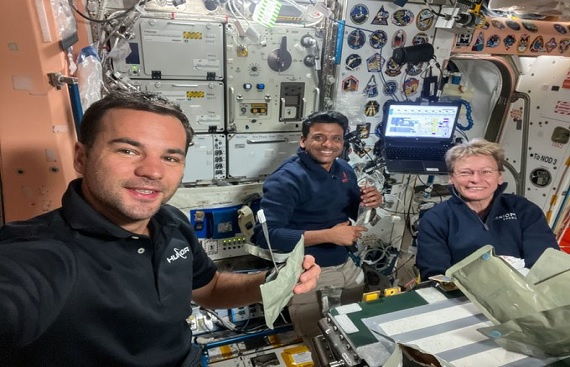India's Group Captain Shukla Tests Brain-Control Tech Aboard ISS
By
siliconindia | Thursday, 03 July 2025, 09:33 Hrs

- Group Captain Shubhanshu Shukla led an experiment aboard the ISS using near-infrared technology to record brain signals and test thought-based communication in microgravity.
- The study, 'Thoughts Over Gravity', aims to measure focus-related brain activity, reduce interference using motion sensors, and develop real-time processing systems for space use.
- Shukla also examined muscle repair in weightlessness and created educational content, while other astronauts supported health studies on blood clots and visual perception in space.
In a groundbreaking experiment aboard the International Space Station (ISS), Group Captain Shubhanshu Shukla of the Indian Air Force is leading a pioneering study into brain-computer interface (BCI) technology. As part of a 14-day mission, Shukla collaborated with astronaut Sawosz Uznanski-Wisniewski in the European Columbus laboratory module to test how effectively human thoughts can interact with machines in microgravity.
The study, titled 'Thoughts over Gravity' (PhotonGrav), utilizes a device called Cortivision fNIRS, which employs near-infrared light to measure brain activity. During the experiment, Wisniewski wore a specially designed cap equipped with sensors that transmitted brain data via Bluetooth to a laptop. While he performed tasks, Shukla calibrated the system and optimized the signal quality.
The main objective of the PhotonGrav study is to evaluate whether astronauts can reliably use their brain signals to operate computers in space. Researchers are particularly focused on monitoring activity in regions of the brain associated with focus and decision-making, such as the dorsolateral prefrontal cortex (DLPFC) and middle frontal gyrus (MFG).
The study also investigates sources of interference in microgravity that might distort brain signal readings and whether motion sensors like accelerometers and gyroscopes can mitigate those disruptions. Additionally, it seeks to assess user-friendliness, effectiveness, and satisfaction among astronauts using this technology, with the broader aim of creating a robust real-time signal processing system for space missions.
In tandem with the BCI research, Shukla also observed muscle cell stem cultures under a microscope to explore the muscle repair process in weightlessness. The crew recorded and downlinked video footage as part of NASA’s Astronaut Mental Health study.
Beyond his scientific responsibilities, Shukla also engaged in educational outreach by recording a video for students, explaining how the human digestive system adapts in space.
Meanwhile, Ax-4 Mission Commander and veteran astronaut Peggy Whitson supported astronaut Tibor Kapu in biomedical assessments aboard the Tranquillity module. Their work supports separate studies on blood clot prevention and preserving visual processing capabilities during extended missions.
These collaborative efforts mark another milestone in advancing human spaceflight and health, with India making a significant imprint on the international space research landscape.
